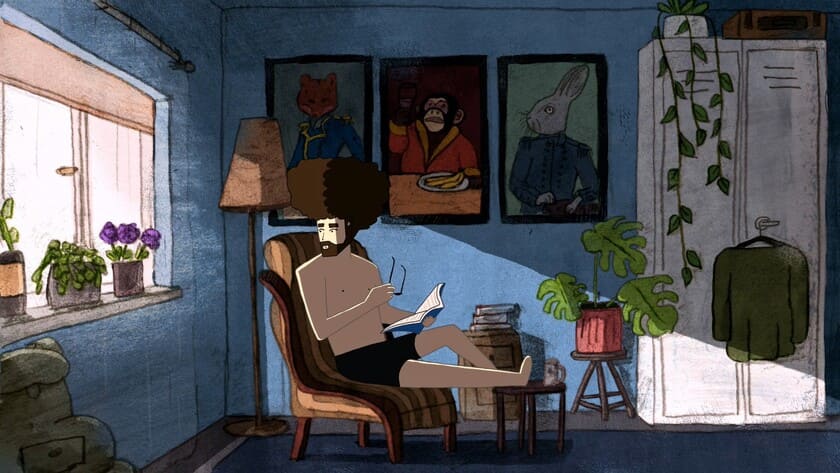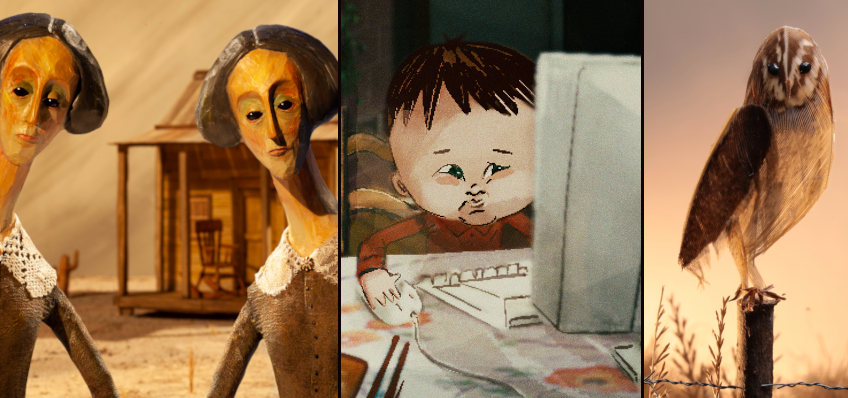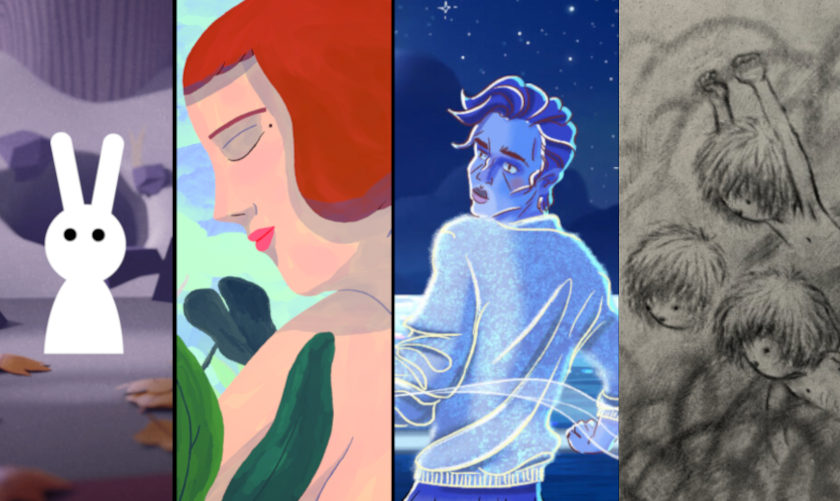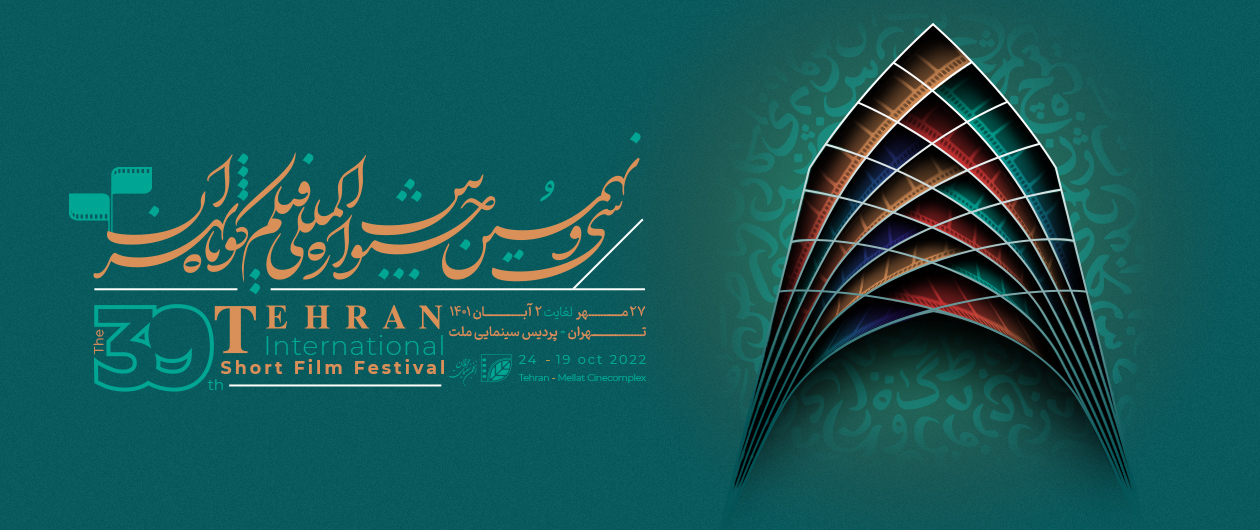Joseph Wallace: Being Online Affects Different Productions In Different Ways (Indie Online 2020)
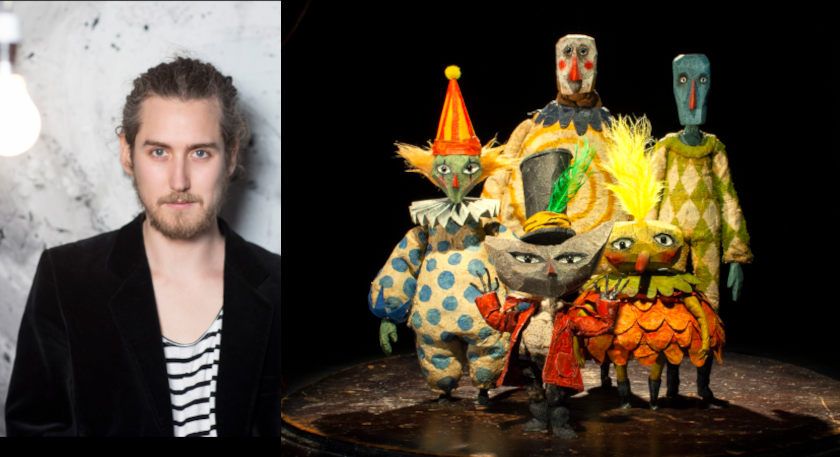
Joseph Wallace, the BAFTA Cymru nominated UK animation director, is no stranger to Zippy Frames, which has followed his latest work Salvation Has No Name from its pitching to o its crowdfuning process. Yet the current pandemic situation was the perfect chance to see how an indie stop-motion animation film is coping during that period; also, to know about its director's thoughts on the already increasing availability of online content and its repercussions. If our online self is here to stay, how to figure out our best response?
We invited Joseph Wallace to talk to Zippy Frames, as part of the Indie Online 2020 project (headed by Michelle Kranot, supported by The Animation Workshop, Viborg).
VK: Usually, our first question to the filmmakers would be: "How did you feel like making this film". In our case, the first question is: "How did you feel like not making this film" when the covid-19 situation erupted?
JW: The short answer is; devastated! This film (Salvation Has No Name) has been a passion project of mine for so many years, and it's taken such a long time to get off the ground in the first place. The funding situation in the UK, and the lack of support for animation (which is gladly changing now) meant it took a lot of time to find the right producer; develop ideas and get it to a point where we were able to pitch the film and find funding. We actually had interest from Europe before we had any support from the UK, so that was tricky because we had to raise finances as the majority producer quickly to be able to secure a co-producer. But we got there in the end.
So there was this long process with the financing of the film, but there’s also been a long thematic development; finding the right story that can deal with these big topics in a sensitive way. And eventually we got to the point where the story was working, the puppets were done, the sets were finished and we were actually shooting the film. Me and my team had found a good rhythm with the shoot and that was when the lockdown hit!
The UK government has been thoroughly inept in dealing with the situation, it’s generally been too little too late and the result of that is that Britain now has one of the worse death-rates per capita in the world. So what we thought was going to be a short pause to the production has now, in reality, delayed the project for about a year. It’s been tough trying to plan and organise the production in this time and inevitably along the way we've lost some of our team to other jobs or other career avenues which is really sad but we have been working hard and the film will hopefully be finished by the end of the year.
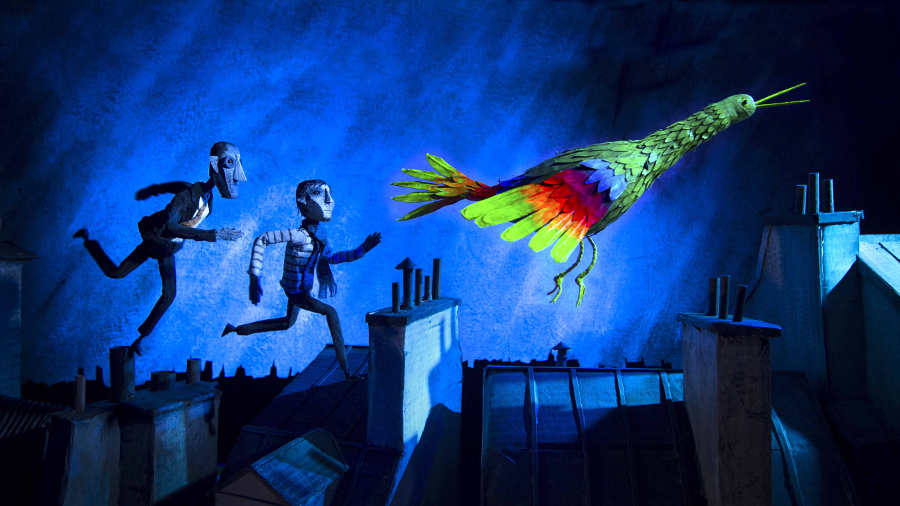
VK: I really admired your crowdfunding initiative during the lockdown. I don't like the word 'proactive'; it makes me think of you as a puppet and someone suddenly pushes you. I'd say you were pushing yourself to the limit, instead of mourning about the situation.
JW: Well, to be honest it was like somebody was pushing me because the whole idea for the Kickstarter really came from my brilliant producer, Loran Dunn. It was something I was definitely hesitant about. When I was working in theatre, I had a lot of friends who had done crowdfunding campaigns for shows and tours and it always felt like poor artists begging other poor artists for money and almost counter-productive. So, I had a funny relationship with crowdfunding. I was apprehensive about the timing too; it was a time when lots of people were struggling and lots of work had been cancelled.
So it was a big leap of faith but I'm incredibly glad we did it, we were just blown away by the support we received to make sure the film gets finished. It’s true what people say about crowdfunding, it's a lot of work mounting and running a campaign, and there’s still a lot of work ahead in fulfilling all the perks and rewards as we advance the production. But, in reflection, I think the most amazing thing that came out of that whole experience was connecting with our audience. I was isolated in my spare room, but through Kickstarster we had all these amazing conversations with people all over the world in America, Europe, Mexico, India. That was really motivating and uplifting, especially during this strange and difficult time.
VK: Just remind me of how crowdfunding would actually benefit you in terms of the budget?
JW: It was really about getting back on our feet after the covid situation ended (which we thought at the time would be over in two months!). The whole film was being made on very limited resources, always balancing the ambition of the storytelling with the means we had to make the film. So when the lockdown happened and we had to leave the Aardman studio where we were shooting, there was a big question as to how we would be able to continue, to remount the production, to make up for money lost that the insurance company wouldn’t cover and for new costs that arose from Covid. So with this Kickstarter money we are much better placed to overcome these obstacles and be able to finish the film.
VK: So, were you able to work on the film in the interim?
JW: Luckily yes. In addition to puppet animation, the film also utilises cut-out animation to punctuate the story and show internal imagery like desires, memories and dreams. These elements were being made by our co-producers Animation People in Prague and were scheduled to happen after the puppet shoot, with me being in Prague directing the team. Then, because of covid we decided to focus on the cut out sequences during the UK lockdown as, at that point, Prague was still operating fairly normally.
It was a difficult decision to direct remotely but with covid (quarantining rules) and Brexit (exclusions for UK nationals) conspiring against us it was really the only option. At this point the UK government, after 4 years, still hadn’t formalised anything with Brexit so separate EU governments were making their own legislation. For someone who has worked in Europe a great deal, with that being a crucial part of my work and my career, it's incredibly sad and frustrating to be hit with penalisation and restrictions. Consequently, a large part of last year was spent directing the cut out sequences of ‘Salvation Has No Name’ remotely; it’s been a crazy experience, but we tried to make the most of the situation.
Watch Salvation Has No Home Trailer:
VK: Why was it a crazy experience? I guess your Prague team was fine and organised and supervised.
JW: Yes Covid-wise they were all safe. I guess it was a crazy experience because I had never directed something remotely like that before. I'm a very hands-on director and I think there were certain complications that may not have arisen if I had been there in person. But it's a learning curve.
VK: Just tell us one of the complications you faced.
JW: Well of course not being there to give directions in person is tough, some things get lost in communication and we had to tweak or reshoot a few things. But we had an amazing, and very patient team in Prague. The animator Alfons Mensdorff-Pouilly has worked a lot with Jiří Barta, the DOP Iván Vít has worked with Jan Švankmajer so it was a dream team for me personally. Neither of them speak much English, so I had an assistant Veronika Skalicka who was from the University of Western Bohemia and she was translating all the storyboards and notes back and forth and that helped enormously with the language barrier. So it was challenging but also a great experience and I’m incredibly pleased with how it all turned out, it really captured this sort of Eastern European quality of movement and evocative imagery that I had in my head.
VK: Is this the future for making and also watching films and animation films in particular?
JW: That's definitely something I've been thinking a lot over the last year. It’s certainly more difficult for stop motion which is such a practical and tactile medium. In terms of watching films, I do feel sorry for filmmakers who had films on the festival circuit during this period. For me, making films is about getting them in front of an audience. If nobody sees it, it feels redundant. It's so much about viewer experience and audience interaction. I love going to festivals and talking to people, I love being in cinemas. It’s scary how quickly these things can disappear and there are cinemas that have been shut down here in the UK, like Cineworld who also owned Picturehouse, which screens arthouse films. When I lived in London the local Picturehouse was my main venue for watching arthouse and world cinema.
I feel cinema has a lot to do with physicality. Having worked in theatre as well I feel acutely aware of that art/audience interaction. It’s experiential. When you put films online as a filmmaker, obviously you have some sense of reaction, whether that's likes or comments or shares or reviews, but that's very different from sitting in the back of a dark auditorium, and having an audience watch your film and hearing their reaction.
VK: But suppose you have all these virtual Zoom cinema panels where you can watch and hear the online audience as well -with all of the clapping in the end.
JW: I'm sure there are ways of emulating this experience. I'm not a good authority on this; I know that many festivals have gone online over the last year and I have great respect and admiration for people's ingenuity in this time. I know it’s been similar for universities, I often lecture about animation and all of that has moved online. I’ve done sessions for British Council Film, Aesthetica festival and a few universities. I feel sorry for students who were in their final year at the University, shooting their final film, their ‘industry calling card’ and had to abandon it all due to Covid.
Stop-motion is so physical, so practical; you need those University resources; the space and the equipment to make those films, unlike perhaps 2D or CGI animation. There was a meta-narrative pushed by certain organisations during lockdown that the UK was ‘open for business' and 'we're carrying on'. Well, if you have pipelines that allow for that, especially for big companies who can facilitate and resource remote working, that's fine. But stop-motion is shot with crews together on physical stages similar to live-action. For smaller productions, it has been difficult to go back on the set; you might not have the money to hire a covid supervisor or to get all the safety equipment. It has affected different productions in different ways.
VK: I was wondering what was the response of BFI and other film funding bodies? Was there any kind of a film relief fund?
JW: There was a relief fund for freelancers in the film industry, which I think was a joint venture between the Film and TV Charity and British Film Institute which had (to their credit) large donations from Netflix. The BFI paused its call for short films in the beginning of the pandemic but this has since been relaunched. People have come together; it's not necessarily government support, it's mostly charities pushing these initiatives.
The government's freelancers' support, The Self Employment Income Support Scheme grant was pitiful really. It was based on your profit rather than your income, and that's not easily applicable to the arts world. It was a capitalist system; those who had money received more, those who didn’t received nothing. So there were many short fallings and actually millions of people who fell through the cracks of the support schemes and have still had no assistance from the government.
VK: That would be my next question. What was the response of the 'commercial' world and the market in this situation? Would you have as a filmmaker more or less offers for commissioned work during this period?
JW: I know people who were participating in US feature film projects and these projects were pushed back or indefinitely delayed. For people with families and kids, these feature film jobs are super important to them for survival. There's been a lot of upheaval. On the flip side, I know some directors who were able to create a home set-up or work on their own who have been doing lots of commercial work, generally advertising has rolled on after a short pause. I’ve been doing some lecturing alongside Salvation and I also produced a Christmas film called ‘Günter Falls in Love’ that was directed by Josephine Lohoar Self. It was for the Irish broadcaster RTE, I produced it with Cardel and it was an international crew with Modelmaking happening the UK and the shoot happening in Berlin, all being managed online.
VK: So, you did something new you hadn't tried before during the lockdown: producing.
JW: Yes, it’s something I’ve been wanting to do more of; using the lessons I’ve learnt from self-producing over the years to help others get work made. Cardel and I have done a lot of commercial work together and it’s great to work with them producing some shorts together, we have another one in development at the moment. Other than that I was lucky to have directed sequences for a feature film last year so that project definitely helped me survive lockdown.
VK: What was the feature film?
JW: It’s a documentary called ‘The Sparks Brothers’, directed by Edgar Wright who made Shaun of the Dead and Hot Fuzz and Baby Driver. The film follows the life and work of Ron and Russell Mael (who are the band Sparks) who I made a music video for back in 2017. Edgar is a director whose work I’ve admired for a long time so it was great collaborating with him. The film was due to be released last year but it got delayed and in the end it premiered at Sundance (the first ever online version) and there’s a wider release planned for later this year. So luckily, the income from that project was able to see me through this period because Salvation is very low budget and fuelled by passion! Anyway, I consider myself lucky I have still had projects to work on, there are certainly people who have had a real struggle. I have creative friends (not just in film in the animation world) who have been re-thinking or changing their careers as a consequence of this situation.
Watch The Sparks Brothers official clip:
VK: Do you think that the covid situation made creative people reflect on what they were doing already? Has this happened in your case as well? Did you have the time to reflect on this, with all things that you've been doing?
JW: I love to work hard. I like trying to get done as much as I can every day and doing multiple projects at the same time, so the last year has been very odd suddenly having very little control over what is happening and what is being accomplished. I went from directing a team and achieving a lot each day, to then suddenly being on my own, in my spare room, on Zoom! I felt very unproductive in this period but we tried to do as much as we could to keep things moving.
VK: But did you actually have time to reflect on this?
JW: This is one of the silver linings. I know it's an international tragedy, but it's also been a sudden change of pace, which I don't often get. I was really burnt-out from doing the feature film project and ‘Salvation’, back to back with no breaks, no time off. I was exhausted. Shoots are incredibly intense and as a director, there are thousands of questions every day and problems for you to solve. In some ways, having this forced break from that intensity gave me a big period of reflection.
I hope ‘Salvation’ will turn out to be a better film in the end from this period of reflection. Aside from the crowdfunding campaign, I had the time to think and develop some elements in more detail. We’ve had puppets finished remotely, outstanding sets finished, voices recorded, refined the storytelling in the animatic and had more time than was originally planned for the cut-out sequences. That breathing space also allowed us to reflect on the first part of the shoot, re-plan things and come back with a stronger pipeline. It’s just frustrating I have to wait another year to see the film in front of an audience!
VK: I was wondering about curating online content. How can you avoid all online festival content looking like a Netflix emulation?
JW: As someone who has worked as a curator and a programmer in the past, I know how much work goes into putting together programmes and considering the audience and I can only imagine it must be even harder making that work effectively online. Programming can be such a wonderful thing, you see it at festivals, when brilliant programmes shine, it lifts each individual film. I don’t know how the interface of ‘the virtual festival’ will evolve but I’ve experienced a few that have worked well so far; Aesthetica, Sundance etc.
VK: Suppose that your own film premieres online. How would you like ‘Salvation Has No Name’ to appear? If you had the single film out there, wouldn't it look more like ordering a steak (or a veggie dish) at a restaurant without any sides?
JW: It’s a sad thought as ‘Salvation’ is truly made for the big screen! But I could imagine having it as part of a curated programme, with filmmaker Q&As. Perhaps in the future, we’ll see both in-person and online festivals. Maybe the travel/accommodation invitation from festivals could be an either/or with an online involvement as a substitute where filmmakers could still watch screenings, join Q&As, so the potatoes and the gravy can work alongside the steak! It's certainly an expensive past time visiting the festival with your film, especially if you don't have a travel grant from a cultural fund so that could make it more open for filmmakers.
It’s interesting, online, to have more information to explore around the films. Like having a replication of a physical brochure with info and stills about the film, the headshot of the filmmaker etc. MUBI do this kind of presentation quite well. That’s something the Quay Brothers got me onto and I’ve been appreciating MUBI’s selection during lockdown as a more curated/provocative alternative to Netflix. One thing that has been nice to see shift, is the accessibility of the work with festivals going online. The subtitles, the audio descriptions, home-access for those with mobility issues. And in another sense, you simply cannot get to every festival and event but when things are online it’s great to be able to tune in and out of certain programmes and online events.
Actually on that note, during the lockdown, there is a London-based cinematographer called Malcolm Hadley, who’s worked on many projects like Isle of Dogs and dozens of commercials, who set up these informal Zoom sessions where he had conversations with various artists from the international stop-motion animation industry. He talked to Nina Gantz, Andy Biddle, Jamie Caliri etc. It went on for two months, and every week he would do these sessions. It wasn't done in the presentation mode on zoom, rather everybody was in the chat with their video on and it ended up being this kind of 'who's who' of stop motion and, since it was online, it was truly international. So, you had people from Laika, Aardman, McKinnon & Saunders etc tuning in. It almost became like a regular networking/catch up thing, and that was a really nice way of feeling connected to people during lockdown when people were so isolated. So, I think there are ways of doing things online where you can get a genuine conversation going.

Edith Piaf Said It Better Than Me, Joseph Wallace (Sparks Music Video)
In a similar vein, the BFI Network has been doing quite a lot of talks and panels; sessions with writers, directors, editors, casting directors, commissioners, financiers and more. That's more of a formal webinar in zoom and less networking but I was lucky to be selected for the BFI Network x BAFTA crew programme this year and that’s included some nice networking sessions on zooms with breakout spaces for different conversations.
VK: What about screening fees for the online content?
JW: I mean I always think it’s great when festivals can offer screening fees. Some distributors always demand screening fees. I don’t think it’s necessarily commonplace for short films but it’s certainly helpful for the filmmaker. The standard approach for animation filmmakers is that we pay to submit to the festival. From my own experience, if a festival asks for your film which is not in competition, then it’s a valid time to ask for a screening fee.
One of the things I did during lockdown was a panel for British Council, where we talked about UK animation, and how things were affected from a festival/distribution point of view. Representatives from Manchester Animation Festival, Cardiff Animation Festival, Maryam Mohajer (My Granddad was a Romantic) participated. Maryam’s film was in the middle of a festival run and she talked about the intricacies of that in terms of screening fees, geoblocking etc. There’s certainly a lot of discussion about screening films online, I think there’s a lot to discovered in terms of infrastructure and best practice.
For me, in general, a finished film has its festival run and then I put it online. On the other hand, commercial work will go straight online, and then we will often do a festival run after. By the time ‘Salvation' is finished later this year, who knows that the distribution scene will look like. But festivals are really important to me. With stop-motion, you're locked in a dark room making the film for such a long time and the idea of travelling out to festivals, being able to have a drink with other filmmakers and talk about the work; it’s a release from the hibernation of stop-motion animation. That's the light at the end of the tunnel!
I really hope we'll be able to visit the festivals and have that physical experience and those conversations. And thinking tactically about the future; there are feature film ideas in development and festivals are a chance for us to go and have these sorts of conversations about new work in person off the back of the film that is screening. I'm always better in person than with emails or phone calls etc. I can pitch ideas more dynamically and I can connect with people more genuinely.
VK: You mentioned there was inept government support for freelancers. Did you have any discussions with other UK creatives (perhaps under the umbrella of the Animation Alliance) to propose a course of action for UK initiatives?
JW: I’m on the Advisory Board for the Animation Alliance UK but I haven’t directly been involved in any support initiatives for covid relief. AAUK has been doing a lot of great work towards better funding for animation over the last few years. It was Abigail Addison and Gary Thomas from Animation Alliance UK and Helen Brunsdon and Kate O’Connor from Animation UK who really pushed and helped set up the new BFI funds. There were lots of animation professionals who fed into the discussions and I sat in on some of the initial meetings with BFI representing directors and animators. Certainly the BFI did a huge amount over the last year to support filmmakers both financially and creatively through various schemes and programmes. Our BFI executive producer for Salvation, Jessica Loveland, is amazing, she was checking in with us and getting a sense of our challenges and what we needed to be able to keep the project going. The charitable fund for freelancers was also spearheaded by BFI. We're lucky that we do have these organisations taking initiative, because the government doesn't value the art the same way that they are in some other countries.
I do think there's definitely a lot more that can be done to support and grow UK animation. There has been a hiatus of support for independent work which is changing now. When you look at big companies here, like Aardman, they had support from Channel 4, BBC, BFI back in the 80s and 90s, that’s how they cut their teeth, grew their studio and developed their vision, their projects and their style.
VK: But now you have Brexit, so you can be more independent and a richer nation!
JW: Ah dear. I recorded a podcast for a great organisation called ‘Visible in Visuals’ a couple of months back where we talked all about Brexit. Freedom of movement is going to be very difficult, and I may have to have a visa to work in Europe, so all these places I have easily collaborated and made work in the past suddenly become problematic to work in. In both ‘Salvation’ and ‘The Sparks Brothers’, we had a really European crew (artists from Poland, France, The Netherlands, Hungary). I love that melting pot of different experiences and different cultures, that makes the work stronger for me.
Bringing in freelancers to work on our projects over here is now almost impossible unless you are a giant production with huge budgets and time for a great deal of paperwork. We have actually lost a brilliant French animator who was due to work on ‘Salvation’ but we now can’t hire her due to Brexit, the rules are, to be quite honest, completely idiotic. With commissioned projects, there's such a quick turnaround, you pitch and then there's just a week before you start working on the project. If paperwork is going to take 8 weeks, it will be impossible to do that. So it's a bit of a depressing outlook; the combination of covid and Brexit but it’s also a motivator to keep international partnerships going and think creatively about how to maintain collaborative work in the future.
VK: Suppose a group of creative artists of martian descent land in the UK in 30 years time. There’s a new outbreak of coronavirus, of which they know nothing about, and want to know of your lessons learned. What would you say to them?
JW: I'd tell them to go to New Zealand! I feel that with the kind of work I make (and this is especially pertinent to stop-motion) is a problem-solving process. You always come up against challenges, and things often happen in a way that you didn't expect them to play out. You're trying to find creative solutions and find ways to navigate day to day challenges. All the while keeping the energy going and keeping your team enthusiastic! So I think as animated filmmakers we have this in-built resistance and perseverance to continue. After all, after spending five years developing and financing an ambitious sixteen minute stop motion drama, a global pandemic isn’t going to get in our way!
We need to be flexible, adaptable and not lose hope. It would have been easy for me and the 'Salvation’ team to have lost all hope, and there were moments when I really felt that we would never be able to finish the film. But it’s important not to underestimate the people out there who are genuinely interested in what you’re making and want to see it made! In times like this it's easy have surges of self-doubt so our support network of fellow artists, collaborators, audiences, critics and festivals are so important to give us the courage and conviction to carry on and find new ways to get work made!
- Read Also: Our Interview Series on Independent Animation Online (Indie Online 2020 Research Project)
About Joseph Wallace
Joseph Wallace is a BAFTA Cymru nominated animation director. His short films have received acclaim and screened at festivals internationally as well as receiving Vimeo Staff Picks. In 2017 he won the Visegrad Animation Forum for his new short Salvation Has No Name, now in production with support from the British Film Institute and the Czech Film Fund. ‘Salvation Has No Name’ is due to be completed towards the end of 2021. ‘The Sparks Brothers’ premiered at Sundance 2021 and is set to have a general release later in the year.
The interview was conducted October 2020 (interviewer Vassilis Kroustallis). It is part of the Indie Online 2020 research project, headed by Michelle Kranot and supported by The Animation Workshop/VIA University College, Center for Animation, Visualization and Digital Storytelling, Denmark.Viborg.




